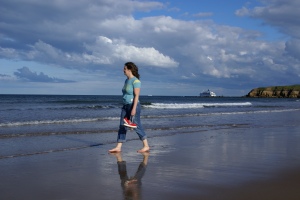I’ve been pondering the Indian summer. What can I say? I’m British. The weather is practically an obsession. But where does the phrase come from? And which Indians does it refer to – Native Americans, or people of the vast land in South Asia?
As ever, that other British institution, the BBC, offers an excellent explanation of its meteorological and social history.
Indian summer refers to a spell of fine autumn weather. It seems to have been commonly used in the USA from the late 1700s, and gained popularity in the UK from the 1950s, presumably as we experienced some spells of warm autumn weather.
For me, it’s a phrase that conjures up memories of forcing my feet into stiff new school shoes after a summer of going barefoot, or wearing sandals and trainers, and never having to bother with insufferable socks. I saw no need to change my clothing while the sun still shone and would stubbornly stick out in short sleeves until I couldn’t escape the goosebumps and the dreaded cardigan any longer.
In searching for the meaning and etymology of Indian summer, I looked for its use in literature. First stop was a poem by William Wilfred Campbell that begins:
Along the line of smoky hills
The crimson forest stands,
And all the day the blue-jay calls
Throughout the autumn lands.
I’m not familiar with Campbell’s poems, but it seems nature, the seasons and landscape are common themes. I imagine Wordworth transplanted from the English Lakes to Canada.
Then, via Wikipedia I find a glimpse of an Indian poet Jayanta Mahapatra writing about an Indian summer:
Over the soughing of the sombre wind
Priests chant louder than ever.
The mouth of India opens:
Crocodiles move into deeper waters.
I’m intruiged, but can find little more than this excerpt and a reference to the poem’s theme of ‘suffering woman’.
Indian summer can also refer to a period of happiness, success and contentment later in life. Maybe that’s what pulls me to the phrase. Dorothy Parker gives this idea her own inimitable twist in her poem ‘Indian Summer’
In youth, it was a way I had
To do my best to please,
And change, with every passing lad,
To suit his theories.
But now I know the things I know,
And do the things I do;
And if you do not like me so,
To hell, my love, with you
Good old Dorothy Parker – always raising an eyebrow and a smile.
For me this year, an Indian summer has offered the simple pleasure of the sun on my face as I walk along the sand, seeking out a spot to sit with my book, or watch the waves. Barefoot, naturally.


Comments are closed.